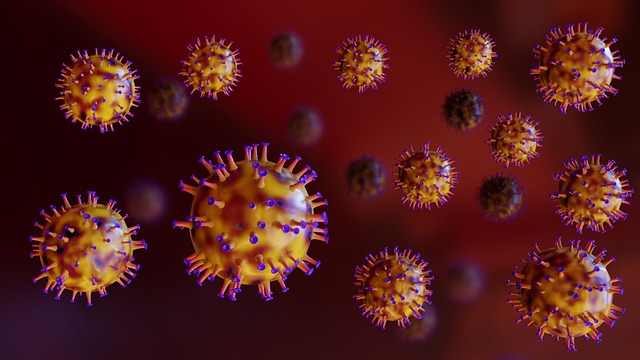An exhalation delivery system that uses the patient’s own breath to deliver the anti-inflammatory compound fluticasone (EDS-FLU) directly to the sinuses reduced symptoms of chronic sinus infection (sinusitis) and decreased associated aggravations and infections with chronic sinus inflammation by more than 50 percent, reported researchers at the Perelman School of Medicine at the University of Pennsylvania. 
Figure: Mechanism of action of the EDS-FLU.
Summary Efficacy of EDS-FLU for Chronic Rhinosinusitis: Two Randomized Controlled Trials (ReOpen1 and ReOpen2) Background Chronic rhinosinusitis ( CRS) is a prevalent inflammatory disease. No medications are approved by the Food and Drug Administration for the most common form, chronic rhinosinusitis (CRS) without nasal polyps (also called “chronic sinusitis”). The new biomechanics of the exhalation delivery system deliver fluticasone (EDS-FLU; Aim To evaluate the efficacy of EDS-FLU for CRS (independent of nasal polyps). Methods Two randomized, placebo- and EDS-controlled trials were conducted in adults with CRS, regardless of polyps (ReOpen1) or exclusively without polyps (ReOpen2) at 120 sites in 13 countries. Patients received EDS-FLU 1 or 2 sprays/nostril, or EDS-placebo, twice daily for 24 weeks. Co-primary measures were composite symptom score through week 4 and percent ethmoid/maxillary sinus opacification by CT scan at week 24. Results The least squares mean change in ReOpen1 composite symptom score (N = 332) for EDS-FLU 1 or 2 sprays/nostril versus EDS-placebo was -1.58 and -1.60 versus -0.62 (p < 0.001, p < 0.001); ReOpen2 (N = 223), −1.54 and −1.74 versus −0.81 (P = 0.011, P = 0.001). In ReOpen1, the least squares mean change in sinus opacification for EDS-FLU 1 or 2 sprays/nasal versus EDS-placebo was −5.58 and −6.20 versus −1.60 (P = 0.045 , P= 0.018), and in ReOpen2, − 7.00 and −5.14 versus +1.19 (p < 0.001, p = 0.009). Acute disease exacerbations were reduced by 56% to 66% with EDS-FLU versus EDS-placebo (P = 0.001). There were significant and similar magnitude reductions in symptoms in patients who used standard-administered nasal steroid products just before entering the study (P < 0.001). Adverse events were similar to those with standard intranasal steroids. Conclusions EDS-FLU is the first nonsurgical treatment shown to reduce symptoms, intrasinus opacification, and exacerbations in replicated randomized clinical trials in CRS, regardless of polyp status. |
Comments
International randomized clinical trials (NCT03781804 and NCT03960580), published in The Journal of Allergy and Clinical Immunology: In Practice , compared EDS-FLU to placebo in more than 500 adults with chronic rhinosinusitis with or without nasal polyps. Patients used EDS-FLU or a placebo twice daily for 24 weeks.
EDS-FLU works when the patient exhales into the device to deliver the medication deeper into the sinus cavities, where the topical medication is most effective. Compared with a placebo, sinus symptom scores and CT scan results were significantly improved. Symptoms of nasal congestion, runny nose, facial pain/pressure, and loss of smell were dramatically improved with EDS-FLU compared to placebo, as measured by the Sinonasal Outcome Test-22, a standardized scoring measure for Sinonasal symptoms. .
"Chronic sinusitis affects up to 10 percent of the United States population and can make breathing uncomfortable and negatively impact a person’s daily life," said senior author James N. Palmer, MD, senior professor of otolaryngology David W. Kennedy, MD. and director of Rhinology at Penn Medicine. "These findings provide strong evidence for an effective, non-invasive treatment option for people who continue to experience symptoms after over-the-counter medications have failed."
Millions of Americans experience the symptoms of chronic sinus infections and inflammation, a largely inflammatory condition that causes nasal congestion, sinus pressure and pain, when the sinus membranes are inflamed for long periods of time. Although over-the-counter nasal sprays offer marginal relief, there is no FDA-approved medication for the most common form of the condition, chronic rhinosinusitis without nasal polyps, known as "chronic sinusitis."
While some nasal sprays may offer some symptom relief, patients using a standard delivery nasal spray prior to study enrollment still reported similar improvements in symptoms compared to other study participants. These are the first placebo-controlled clinical trials to show that a medication reduces subjective symptoms and objective measures of sinus disease in patients with chronic sinusitis, both with and without polyps. Currently, patients whose symptoms do not resolve with over-the-counter nasal sprays or other medications have limited options for relief, including antibiotics, surgery, or, for patients with nasal polyps, lifelong biologic therapies.
EDS-FLU was determined to be as safe as standard over-the-counter nasal sprays.
What is already known about this topic?
No medications are approved by the Food and Drug Administration for the treatment of chronic sinusitis without nasal polyps. Standardly administered nasal corticosteroids are used despite limited evidence suggesting a lack of significant efficacy. Previous NAVIGATE trials demonstrated the effectiveness of the fluticasone exhalation delivery system (XHANCE) for nasal polyps.
What does this article contribute to our knowledge?
The fluticasone exhalation delivery system is the first nonsurgical treatment that has been shown to improve symptoms, sinus opacification, and acute exacerbations in CRS patients with or without nasal polyps, including CRS patients whose symptoms persist with the use of standard administration nasal steroids.
How does this study impact current management guidelines?
This is the first placebo-controlled evidence demonstrating the efficacy of any medication in CRS without nasal polyps. The fluticasone exhalation delivery system is an appropriate first-line treatment for CRS, even when symptoms persist with over-the-counter medications, before moving on to surgery or systemic therapy.
The study was funded by OptiNose US, Inc., and the company submitted a new drug application to the FDA for EDS-FLU for chronic rhinosinusitis without nasal polyps based on the results of this study.
















